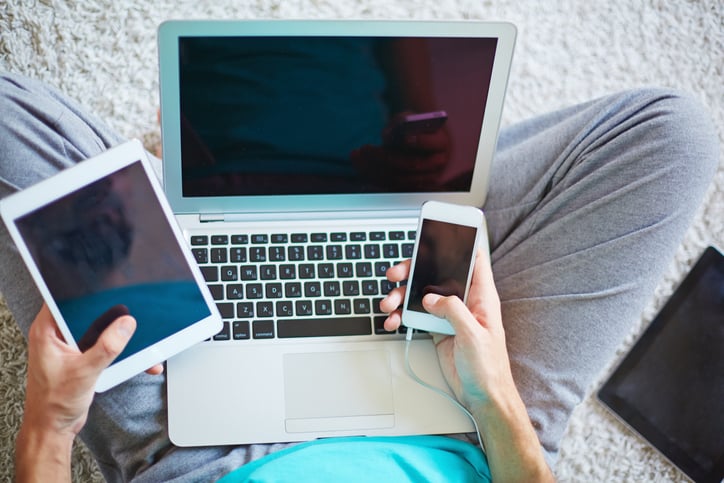4 Daily Habits That Are Hurting Your Health

Our daily habits can become such an ingrained part of our routines that we may barely even notice ourselves doing them over time. But, some of these habits could seriously be hurting your health. Sure, they may not seem like a big deal when you do them once in a while, but once they become habits, it’s time to revisit and make some changes.
What Is a Habit?
According to Wikipedia, “a habit… is a routine of behavior that is repeated regularly and tends to occur subconsciously.” It’s been said that you are what you repeatedly do. That means you are the product of your daily habits, both in thought and in action. This can be either a good thing or a bad thing.
“Chains of habit are too light to be felt until they are too heavy to be broken.” – Warren Buffett
Yes, unfortunately, these things start out small and creep up slowly. So, the first thing to do is become aware of some of the things you do repetitively that may be harming your health. Here is a list of four very common behaviors many of us engage in, and what you can do to start breaking these bad habits.
4 Common Habits Hurting Your Health

1. Too much screen time- everything these days seems to be electronic, from your daily news to your books. But, that doesn’t mean it’s healthy. In fact, it can be incredibly unhealthy when screens become your main mode of enjoyment and taking in information.
What should you do instead?
Psychology Today says it’s important to limit screen time for a variety of reasons, including sensory overload. This can affect everything from an increased propensity to violence to physical changes in brain tissue and even an increase in depression. Professor of Ophthalmology, Dr. Christopher Starr, at Weill Cornell Medical College in New York, says it’s essential to take breaks from your screen every 20 minutes; otherwise you can incur harmful eye strain.
Not tearing yourself away from screens is also a recipe for horrible sleep. It’s important to wind down an hour or two before bedtime, and part of that wind-down ceremony is nixing the blue light. The National Sleep Foundation reports too much screen use in the hours leading up to bedtime can cause interruptions in your circadian rhythm, suppresses melatonin, increases cortisol, and prevents restorative sleep.

2. Skimping on sleep—speaking of sleep, staying up way too late might seem fun, fashionable, and feasible. But, in the long run (and even the short term) sleep deprivation is no laughing matter. Not only does sleep deprivation wreak havoc on your skin, eyes, and general appearance, but it can compromise your health.
What should you do instead?
As discussed, it’s a good idea to limit your screen time, especially an hour or two prior to bed. You want your brain and body to be relaxed by the time you hit the sack.
You can also create some ceremony around bedtime. For example, try taking a relaxing bubble bath or lighting some candles at night. Try reading an “old-fashioned” book [gasp!]—the type made out of actual paper that you read next to a soft light while curled up on the couch or in bed.
You can also use aromatherapy like lavender to help calm your senses and mentally prepare for a good night’s sleep.
And, of course, be sure to keep your bedroom cool and dark. Try for quiet, but if you can’t, then consider using a noise machine for some “white noise” to help you sleep without interruption. Aim for 7 – 8 hours per night of good quality sleep to allow yourself to function at full capacity.

3. Drinking everything but water—water is essential to your health. Many folks think they are staying hydrated because they’ll drink coffee, tea, energy drinks, diet sodas, and sports drinks all day long. The problem is, you need to drink water; not just drinks made with water.
What should you do instead?
Drink water. It’s that simple. What are the benefits of drinking water? How about this one…? Water helps flush fat from the body. Not only that, but water helps you stave off hunger pangs and feel full longer. Now if there ever were a reason to drink water, I think that might be close to the top of the list! Also, water helps lubricate your joints and keep your skin supple. I don’t know about you, but staying supple and staying young seem to be pretty similar goals, and if adding a little refreshing water to your day is all it takes, I’d say that’s a pretty easy and worthwhile fix.

4. Mindless eating—this is a big one, and it’s easy to do. If you find yourself eating at your desk, or nibbling away while in front of the television, it’s time to stop and look at what you’re doing.
What should you do instead?
Just eat and only eat. What does that mean? It means don’t try to do multiple things at once while also trying to eat a meal. Consuming food while multi-tasking leads to mindless eating, and this typically leads to overeating and weight gain. Instead, set aside 15 – 20 minutes to focus on your food exclusively. That means no distractions like television, magazines, or surfing the internet.
It’s also helpful to portion out your food in advance. Instead of buying in bulk and noshing out of the bag, put a small portion on a plate and eat that. You can always have another serving if you’re still hungry. And, if you’re not hungry… well, then you shouldn’t be eating in the first place, should you?
The take-home point here is that habits are easy to form and difficult to break. The best thing you can do is take stock of what you’re doing on a regular basis that may be harming your health. Then, take steps to replace those hurtful habits with healthier ones. You may not be able to change everything at once, nor should you try. But, over time, with diligence and attention to routines, you should be able to swap your unhealthy habits for good. The good news is, once you make healthy actions into habits, those, too, will be hard to break!






